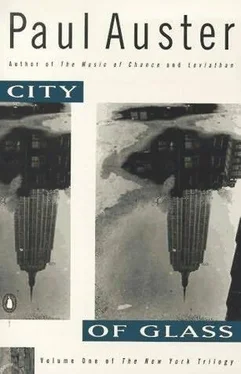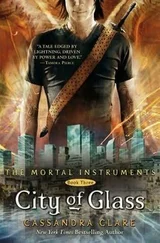Paul Auster - City of Glass
Здесь есть возможность читать онлайн «Paul Auster - City of Glass» весь текст электронной книги совершенно бесплатно (целиком полную версию без сокращений). В некоторых случаях можно слушать аудио, скачать через торрент в формате fb2 и присутствует краткое содержание. Жанр: Современная проза, на английском языке. Описание произведения, (предисловие) а так же отзывы посетителей доступны на портале библиотеки ЛибКат.
- Название:City of Glass
- Автор:
- Жанр:
- Год:неизвестен
- ISBN:нет данных
- Рейтинг книги:5 / 5. Голосов: 1
-
Избранное:Добавить в избранное
- Отзывы:
-
Ваша оценка:
- 100
- 1
- 2
- 3
- 4
- 5
City of Glass: краткое содержание, описание и аннотация
Предлагаем к чтению аннотацию, описание, краткое содержание или предисловие (зависит от того, что написал сам автор книги «City of Glass»). Если вы не нашли необходимую информацию о книге — напишите в комментариях, мы постараемся отыскать её.
City of Glass — читать онлайн бесплатно полную книгу (весь текст) целиком
Ниже представлен текст книги, разбитый по страницам. Система сохранения места последней прочитанной страницы, позволяет с удобством читать онлайн бесплатно книгу «City of Glass», без необходимости каждый раз заново искать на чём Вы остановились. Поставьте закладку, и сможете в любой момент перейти на страницу, на которой закончили чтение.
Интервал:
Закладка:
His watch read nearly six. Quinn walked home the way he had come, lengthening his strides with each new block. By the time he came to his street, he was running. It's June second, he told himself Try to remember that. This is New York, and tomorrow will be June third. If all goes well, the following day will be the fourth. But nothing is certain.
The hour had long since passed for his call to Virginia Stillman, and he debated whether to go through with it. Would it be possible to ignore her? Could he abandon everything now, just like that? Yes, he said to himself, it was possible. He could forget about the case, get back to his routine, write another book. He could take a trip if he liked, even leave the country for a while. He could go to Paris, for example. Yes, that was possible. But anywhere would do, he thought, anywhere at all.
He sat down in his living room and looked at the walls. They had once been white, he remembered, but now they had turned a curious shade of yellow. Perhaps one day they would drift further into dinginess, lapsing into gray, or even brown, like some piece of aging fruit. A white wall becomes a yellow wall becomes a gray wall, he said to himself. The paint becomes exhausted, the city encroaches with its soot, the plaster crumbles within. Changes, then more changes still.
He smoked a cigarette, and then another, and then another. He looked at his hands, saw that they were dirty, and got up to wash them. In the bathroom, with the water running in the sink, he decided to shave as well. He lathered his face, took out a clean blade, and started scraping off his beard. For some reason, he found it unpleasant to look in the mirror and kept trying to avoid himself with his eyes. You're getting old, he said to himself, you're turning into an old fart. Then he went into the kitchen, ate a bowl of cornflakes, and smoked another cigarette.
It was seven o'clock now. Once again, he debated whether to call Virginia Stillman. As he turned the question over in his mind, it occurred to him that he no longer had an opinion. He saw the argument for making the call, and at the same time he saw the argument for not making it. In the end, it was etiquette that decided. It would not be fair to disappear without telling her first. After that, it would be perfectly acceptable. As long as you tell people what you are going to do, he reasoned, it doesn't matter. Then you are free to do what you want.
The number, however, was busy. He waited five minutes and dialed again. Again, the number was busy. For the next hour Quinn alternated between dialing and waiting, always with the same result. At last he called the operator and asked whether the phone was out of order. There would be a charge of thirty cents, he was told. Then came a crackling in the wires, the sound of further dialing, more voices. Quinn tried to imagine what the operators looked like. Then the first woman spoke to him again: the number was busy.
Quinn did not know what to think. There were so many possibilities, he could not even begin. Stillman? The phone off the hook? Someone else altogether?
He turned on the television and watched the first two innings of the Mets game. Then he dialed once again. Same thing. In the top of the third St. Louis scored on a walk, a stolen base, an infield out, and a sacrifice fly. The Mets matched that run in their half of the inning on a double by Wilson and a single by Youngblood. Quinn realized that he didn't care. A beer commercial came on, and he turned off the sound. For the twentieth time he tried to reach Virginia Stillman, and for the twentieth time the same thing happened. In the top of the fourth St. Louis scored five runs, and Quinn turned off the picture as well. He found his red notebook, sat down at his desk, and wrote steadily for the next two hours. He did not bother to read over what he had written. Then he called Virginia Stillman and got another busy signal. He slammed the receiver down so hard that the plastic cracked. When he tried to call again, he could no longer get a dial tone. He stood up, went into the kitchen, and made another bowl of cornflakes. Then he went to bed.
In his dream, which he later forgot, he found himself walking down Broadway, holding Auster's son by the hand.
Quinn spent the following day on his feet. He started early, just after eight o'clock, and did not stop to consider where he was going. As it happened, he saw many things that day he had never noticed before.
Every twenty minutes he would go into a phone booth and call Virginia Stillman. As it had been the night before, so it was today. By now Quinn expected the number to be busy. It no longer even bothered him. The busy signal had become a counterpoint to his steps, a metronome beating steadily inside the random noises of the city. There was comfort in the thought that whenever he dialed the number, the sound would be there for him, never swerving in its denial, negating speech and the possibility of speech, as insistent as the beating of a heart. Virginia and Peter Stillman were shut off from him now. But he could soothe his conscience with the thought that he was still trying. Whatever darkness they were leading him into, he had not abandoned them yet.
He walked down Broadway to 72nd Street, turned east to Central Park West, and followed it to 59th Street and the statue of Columbus, There he turned east once again, moving along Central Park South until Madison Avenue, and then cut right, walking downtown to Grand Central Station. After circling haphazardly for a few blocks, he continued south for a mile, came to the juncture of Broadway and Fifth Avenue at 23rd Street, paused to look at the Flatiron Building, and then shifted course, taking a westward turn until he reached. Seventh Avenue, at which point he veered left and progressed further downtown. At Sheridan Square he turned east again, ambling down Waverly Place, crossing Sixth Avenue, and continuing on to Washington Square. He walked through the arch and made his way south among the crowds, stopping momentarily to watch a juggler perform on a slack rope stretched between a light pole and a tree trunk. Then he left the little park at its downtown east corner, went through the university housing project with its patches of green grass, and turned right at Houston Street. At West Broadway he turned again, this time to the left, and proceeded onward to Canal. Angling slightly to his right, he passed through a vest pocket park and swung around to Varick Street, walked by number 6 where he had once lived, and then regained his southern course, picking up West Broadway again where it merged with Varick. West Broadway took him to the base of the World Trade Center and on into the lobby of one of the towers, where he made his thirteenth call of the day to Virginia Stillman. Quinn decided to eat something, entered one of the fast-food places on the ground floor, and leisurely consumed a sandwich as he did some work in the red notebook. Afterwards, he walked east again, wandering through the narrow streets of the financial district, and then headed further south, towards Bowling Green, where he saw the water and the seagulls above it, careening in the midday light. For a moment he considered taking a ride on the Staten Island Ferry, but then thought better of it and began tracking his way to the north. At Fulton Street he slid to his right and followed the northeastward path of East Broadway, which led through the miasma of the Lower East Side and then up into Chinatown. From there he found the Bowery, which carried him along to Fourteenth Street. He then hooked left, cut through Union Square, and continued uptown along Park Avenue South. At 23rd Street he jockeyed north. A few blocks later he jutted right again, went one block to the east, and then walked up Third Avenue for a while. At 32nd Street he turned right, came upon Second Avenue, turned left, moved uptown another three blocks, and then turned right one last time, whereupon he met up with First Avenue. He then walked the remaining seven blocks to the United Nations and decided to take a short rest. He sat down on a stone bench in the plaza and breathed deeply, idling in the air and the light with closed eyes. Then he opened the red notebook, took the deaf mute's pen from his pocket, and began a new page.
Читать дальшеИнтервал:
Закладка:
Похожие книги на «City of Glass»
Представляем Вашему вниманию похожие книги на «City of Glass» списком для выбора. Мы отобрали схожую по названию и смыслу литературу в надежде предоставить читателям больше вариантов отыскать новые, интересные, ещё непрочитанные произведения.
Обсуждение, отзывы о книге «City of Glass» и просто собственные мнения читателей. Оставьте ваши комментарии, напишите, что Вы думаете о произведении, его смысле или главных героях. Укажите что конкретно понравилось, а что нет, и почему Вы так считаете.












